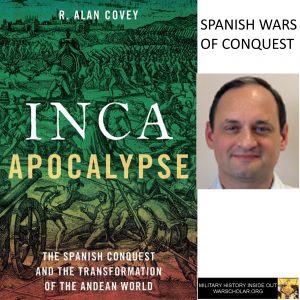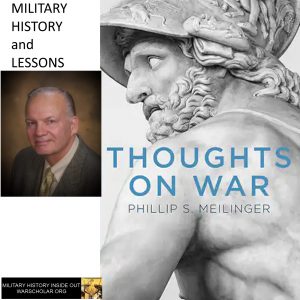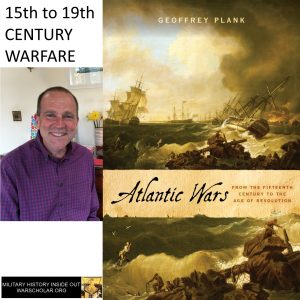 Spanish wars of conquest – An interview with Alan Covey about his new book Inca Apocalypse published by Oxford University Press. The book discusses the Spanish conquest of the Incas. Check out the book here https://amzn.to/2EAvVFj
Spanish wars of conquest – An interview with Alan Covey about his new book Inca Apocalypse published by Oxford University Press. The book discusses the Spanish conquest of the Incas. Check out the book here https://amzn.to/2EAvVFj
How did you become interested in studying and writing on the subject of your book?
The Spanish conquest of the Incas has always been an important aspect of the work that I do in the Andes. It lies between the two lines of evidence that I work with: prehistoric archaeology and colonial archival documents. The conquest story stands apart from those two records, and the Spanish chronicles that provide the most vivid detail aren’t always easy to line up with the other evidence, so I was always a little intimidated about trying to work them all together.
What is the book about and what major themes do you focus on?
The book features the religious worldview of the Incas and Spaniards, presenting the conquest of the Andes as a drawn-out transformation that could be interpreted as the end of the world, or the start of a new era. I focus on the ways that the Inca and Spanish empires were both engaged in building civilizations, and how the Spanish conquest was only possible with indigenous support. Even though most of the Incas became Christians and supported the Spanish crown, it took decades for the Spaniards to establish dominance over much of what remained of the Inca world.
Did any of the evidence you found address whether either the Spaniards or Incas were surprised to have discovered each other? In other words, in their respective worldviews did either expect a cataclysmic clash of civilizations at some point as their empires grew?
The Spaniards were probably less surprised to encounter the Incas than the other way around. When Columbus sailed, he thought he would reach the Mongol Empire and seek an alliance against Spain’s Muslim enemies, and in the 40 years that followed, Spaniards recognized that many native societies had hereditary leaders who could be quite powerful. Pizarro sailed south from Panama to follow the rumor of a wealthy lord living just beyond where other Spaniards had explored. The Incas probably expected that their world would end in natural disasters (earthquakes, tsunamis, volcanoes) rather than a foreign invasion.
What did you find to be the biggest culture clashes between the two empires? Both obviously were ready to engage in war to protect themselves but were there approaches that stood in stark contrast to each other?
Although there were a lot of ways that the two empires were alike, there were also important ways that they differed, which created misunderstandings about each other. For example, the Spaniards thought that the Pope had granted them dominion over half of the world, so they felt comfortable taking food and clothing and native porters from the communities they passed through. The Incas saw them as a lawless men who didn’t know the land or even how to eat properly, and when the Spaniards ate Inca food and drank Inca beer, it signaled that they were Inca subjects, rather than the other way around. As Spaniards and Andean lords worked to forge alliances and gain the greatest advantage as the world changed, their interactions could be ambiguous, interpreted in different ways by European and Andean people. When it came to fighting, the Incas had shown that they were capable of brutal campaigns that relied on shock troops and violent retribution to bring frontier peoples in line. The Spaniards didn’t fight by the same rules–they attacked without warning, tortured and burned their allies, and brought new weapons to the battlefield (like horses and firearms). Over time, native people acquired those weapons and learned to fight against them successfully, and they learned guerilla tactics that worked when Spaniards were few in number and in remote places.
Were the smaller groups that had been previously conquered by the Incas ready to turn against them and why? Or were the Incas seen as the better alternative to the new Spanish Empire?
The Inca civil war that was wrapping up when Pizarro went into the Andean highlands had forced local lords to choose sides, and Atahuallpa (the victorious Inca prince) had passed through the north Pacific coast where Pizarro arrived just months earlier, killing local people and taking their women. Atahuallpa’s captains had occupied Cuzco, the Inca capital, where they wiped out some royal families and declared an intent to force the nobility to migrate to Quito. And there were provinces that had ceased to pay Inca tribute during the war, which Atahuallpa planned to visit and punish. So the Spaniards turned up on a landscape where lots of Andean people were either looking for revenge, trying to survive, or hoping to maintain newfound independence. The Spaniards didn’t seem like an especially formidable force when it came to fighting across the entire Andean region, but they were dangerous and violent, and when they offered to fight for native lords, or to protect them, it was an appealing offer.
What resource materials or archives did you primarily use for your research?
To discuss the Inca Empire and its claims to civilize the Andes, I used recent archaeological evidence alongside colonial descriptions of the Inca world. For other parts of the book, I used published chronicles, as well as a large body of unpublished manuscripts from libraries and archives in South America and Europe. I also consulted scholarly studies of literature that was beyond my own expertise.
What did you discover in your research that most surprised you?
I think the thing that surprised me most was how much the first-hand descriptions differ from the popular versions of the story that have been published in recent years. One theme that really stood out was how Pizarro and his allies knowingly violated the terms that they had agreed to with royal officials, and how the Spanish crown had to spend decades trying to figure out how to rein in unruly conquistadores–often with the Incas and other Andean lords as their allies.
Was there a particularly difficult issue to research because of lack of information or access to information?
Probably the biggest challenge to assembling this book was the sheer scale of documents and other evidence that could be used for a big-picture story like the one I wanted to tell. As a social scientist, I went into the project trying to bring in as much evidence as possible, but I realized that I could fill a book (and more) just with a bibliography of publications and archival manuscripts.
Did you have any difficulties in finishing or publishing and how did you overcome those?
I was fortunate to have support from the University of Texas to devote a semester to writing, which allowed me to build a momentum that I was able to keep for the rest of the project. My wife, who is also a professor, was really supportive and patient at times when the project required more time and focus. The folks at Oxford University Press were really accommodating, and I felt like I had room to write the book that needed to be written.
What is your current or next writing project?
Right now, I am in the early stages of a project that builds on some of the things I learned writing Inca Apocalypse. The Incas became an important point of debate among early modern Europeans, and I am working on a book that explores how representations of the Incas evolved as Europeans moved out of medieval modes of thought, through the Enlightenment, and into the theories that drive the social sciences today.
Where can people find you online?
I don’t do social media, so my page at the University of Texas is the best place to keep up with my work.
Biographical information
Name: Professor Alan Covey
Bio: AB Dartmouth College (1996), PhD University of Michigan (2003), postdoctoral training at the American Museum of Natural History. I’ve held tenure at Southern Methodist University and Dartmouth College before coming to my present position.
Position and specialty: Professor of Anthropology
Affiliation: University of Texas at Austin
Project/work being discussed: Inca Apocalypse
Links of interest
Check out the book here https://amzn.to/2EAvVFj
https://global.oup.com/academic/product/inca-apocalypse-9780190299125?cc=us&lang=en&
https://liberalarts.utexas.edu/anthropology/faculty/rc39628
As an Amazon Associate I earn from qualifying purchases.
 Phillip Meilinger interview about his military history and lessons book “Thoughts on War”
Phillip Meilinger interview about his military history and lessons book “Thoughts on War”

 Geoffrey Plank interview about his 15th to 19th centuries military history book “Atlantic Wars”
Geoffrey Plank interview about his 15th to 19th centuries military history book “Atlantic Wars” Spanish wars of conquest – An interview with Alan Covey about his new book Inca Apocalypse published by Oxford University Press. The book discusses the Spanish conquest of the Incas.
Spanish wars of conquest – An interview with Alan Covey about his new book Inca Apocalypse published by Oxford University Press. The book discusses the Spanish conquest of the Incas.